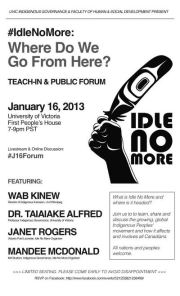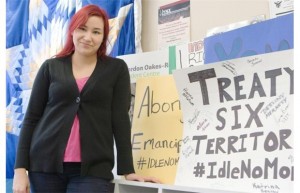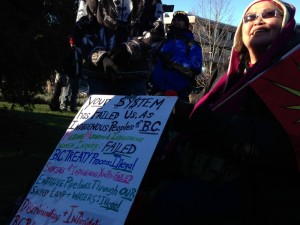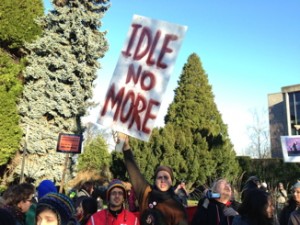Dal News, Misha Noble-Hearle, January 18, 2013 — Thirty years ago, Patricia Doyle-Bedwell sat in Dalhousie’s Student Union building with four other aboriginal students discussing issues such as class, racism and indigenous rights. She would never have guessed that 30 years later, more than 400 people would be packed into the Scotiabank Auditorium in support of, or simply eager to learn about, the same issues.
“I am overwhelmed with joy for the support of Idle No More,” says the Dalhousie professor and director of the Transition Year Program, speaking about the teach-in event held on campus last week.
Growth of a movement
Idle No More is a grassroots movement that began as an email exchange between four aboriginal activists in Saskatchewan last fall. Their discussions focused on Bill C-45, a 400-page bill passed in December 2012 by the Canadian government that made changes to the Indian Act, the Navigation Protection Act and the Environment Assessment Act, among others.
Worried how these changes would affect them and their treaty rights, the activists organized a rally in Saskatoon peacefully protesting the bill. Since then, the movement has caught fire, spreading rapidly and prominently around the country.
With live tweets during events and more than 75,000 “likes” on Facebook, Idle No More is powered by social media as well as the inaccuracies of mainstream media, says Howard Ramos, a faculty member in the Department of Sociology and Social Anthropology and an expert in Canadian Aboriginal mobilization and issues of ethnicity and race.
“The movement spread not just through social media, but when the media got it wrong,” says Dr. Ramos.
Often, Idle No More has been portrayed in affiliation with Attawapiskat Chief Theresa Spence’s hunger strike. After declaring that her First Nations band in Northern Ontario was in a state of emergency due to severe economic issues, she began a liquids-only diet on Dec. 11, 2012, demanding a meeting with Stephen Harper and Governor-General David Johnston. This media coverage sparked interest in Idle No More, merging the two separate movements, but Idle No More is about a lot more than one hunger strike.
The protection of Aboriginal Rights and environmental concerns are high on the to-do list of Idle No More organizers and supporters, but the movement also provides a platform for social learning and “unlearning,” an idea that Erin Wunker, English professor, explained at the January 8 event. She defined unlearning as the act of acknowledging something we thought was true as not being the truth.
“I am part of a population that has learned that I have always had a right to be here, and that is untrue,” said Wunker, identifying herself as a descendant of European-Canadian settlers. “We need to learn each other’s stories and unlearn the dominant discourse of them.”
Sparking a dialogue
Idle No More promotes education about issues that affect not only Aboriginal Canadians, but all Canadians, say those who are following it closely.
Read More: Dal News

 Follow
Follow



